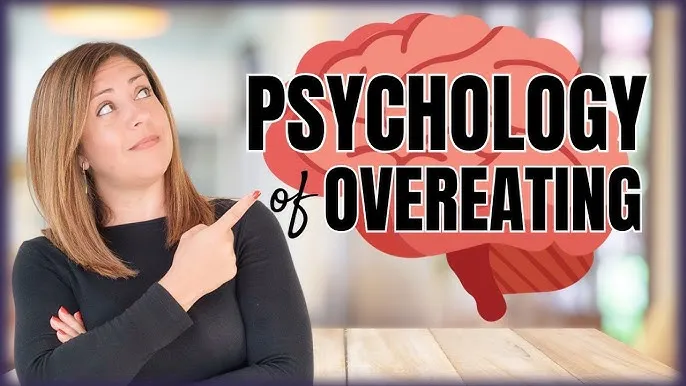Have you ever thought about why we eat snacks or sweets, even when we’re not hungry? Overeating is often connected to our emotions and thoughts.
I’ve been through it myself and helped others with the same struggles. I’ve learned that our feelings affect how we eat. Diets don’t usually work for long, but understanding why we eat can make a big difference. Food is often a way to deal with emotions, and finding new ways to cope can really help.
In this guide, I’ll explain simple reasons why we overeat and share easy tips to help stop. These ideas come from my own experiences and what I’ve learned.
The Psychology of Overeating Explained
Emotional eating is a common reason people overeat. It means eating food to deal with feelings like stress, sadness, or boredom instead of facing them. Even happy times, like celebrations, can lead to emotional eating. But it’s usually negative feelings that cause it the most. Using food for comfort can make you feel guilty or frustrated. Many think they have no willpower, but diets can make it worse by making you hungrier and crave more. This isn’t a lack of control—it’s just your body reacting to not getting enough food. Once your body has enough food, you can start to understand the feelings behind your eating.
Understanding the Psychological Reasons for Overeating
Understanding why we overeat can help us change our habits. Many people eat too much when they feel sad, stressed, or bored. Some eat for comfort or as a reward. Others eat out of habit, like snacking while watching TV. Past experiences with food can also affect how we eat now. Sometimes, people overeat to avoid bad feelings. Eating can also be a way to feel in control or handle stress. When we notice these reasons, we can make better choices. Learning our eating patterns helps us have a healthier relationship with food. This is the first step to change.
1. Limiting Beliefs Can Fuel Overeating & Self-Sabotage

Many people overeat because, in some way, it feels safer than stopping. This may sound surprising—how can overeating be helpful? But deep down, it can act as a way to protect yourself.
Take people-pleasing, for example. Some people eat too much to keep certain relationships the same. If they lose weight, they might worry about losing friends who struggle with the same issues. This can create inner conflict, making overeating feel like the easier choice.
Recognizing this is important. If we don’t see the hidden reasons behind overeating, breaking the habit is much harder. My bestselling workbook, Why We Do the Things We Do, helps uncover these patterns and create real change.
2. Emotional Hunger Can Be Confused With Physical Hunger

Physical hunger is the body’s way of telling us it needs food. It comes on slowly and causes feelings like an empty stomach or dizziness.
Emotional hunger is based on feelings, not the body’s need for food. It can happen suddenly and feel very strong, often due to stress or emotions. Eating for emotional reasons or past physical hunger can lead to overeating.
For those who diet a lot, this can be even harder. Dieting often means ignoring hunger, making it difficult to recognize real hunger signals.
3. Psychological Stress Causes Overeating for Various Reasons

Stress can lead to overeating by affecting both our mind and body. It does this mainly through hormones.
Cortisol, the “stress hormone,” makes you feel hungrier and crave high-calorie comfort foods. Stress can also increase ghrelin, the hormone that controls hunger, making you want to eat more. Stress affects insulin, which helps control blood sugar. High cortisol levels can make the body resist insulin, causing stronger cravings for sweets and carbs. This can lead to overeating.
Counting calories can also be stressful, which makes it harder to lose weight. This is why many people have trouble with diet programs like Weight Watchers or Noom.
4. Food Rules Trigger Overeating Through Reverse Psychology
Restricting food can make you feel deprived, which often leads to overeating. When we tell ourselves we can’t have certain foods, we tend to think about them even more. Studies show that even if we eat enough calories, just the idea of limiting foods can create a sense of deprivation. This can lead to a cycle of restriction and bingeing.
For example, research found that people who love chocolate and try to avoid it end up craving it even more. This happens even when they aren’t cutting calories. If you often think about food, try to notice which foods come to mind the most. Are they the ones you allow yourself to eat, or the ones you consider off-limits?
5. Sugar Addiction Is Better Explained Through Eating Psychology
The idea of sugar addiction is debated. Some studies say sugar is more addictive than drugs, while others find little proof in humans. Both sides have different views on the topic.
Some experts believe sugar triggers dopamine release in the brain, making people crave it like a drug. However, most studies on sugar addiction were done on rats, not humans. This makes it unclear if the findings apply to people.
Many of these studies also gave rats sugar only at certain times. This may have made them crave it because they expected it to be taken away, not because it was truly addictive.
6. The Fear Wasting Food Is One of the Biggest Psychological Reasons for Overeating
The fear of wasting food can lead to overeating. Many people feel guilty about leaving food on their plate, so they eat everything even when full. This habit often starts in childhood. Parents may tell children to finish their meals before leaving the table. Some kids are praised for eating everything, even if they aren’t hungry.
As adults, these habits continue. Restaurants serve large portions, making it easy to overeat. People may feel bad about throwing food away, so they eat more than they need. Over time, this can lead to unhealthy eating patterns. Learning to listen to hunger cues can help break this cycle. It’s okay to save leftovers or eat smaller portions.
7. Eating Too Fast Can Lead Too Overeating
Eating too fast can make you overeat because your body needs time to feel full. It’s not just about food—it’s also about how you live. People who rush through meals often have busy lives.
For example, people with stressful jobs make quick decisions and do many things at once. This habit can carry over to eating. They may eat fast without noticing how much they eat.
Simply saying “eat slower” is not enough. To change this habit, you need to look at both hunger and emotions. Slowing down in life can help you slow down with food too.
8. A Lack of Satisfaction Can Trigger Overeating
One reason people overeat is because they don’t feel satisfied after eating, which is often ignored by diet culture. Diets focus on what we “should” and “shouldn’t” eat, not on whether the food actually makes us feel full or happy. When we don’t feel satisfied, we may feel deprived and look for more food, even if we’re not hungry.
For example, if you want pizza but eat a salad instead, the salad might fill you up, but it won’t satisfy your craving. You might keep snacking to fill that gap. Eventually, you’ll probably eat the pizza anyway, repeating the cycle of restricting and overeating. This can make it hard to stop overeating.
9. Poor Environment Design Can Lead to Mindless Eating
If you’ve ever had trouble resisting office snacks, you’re not alone. Studies show that candy in a clear dish is eaten more than candy in a covered dish because it’s easier to see. Another study found that putting candy farther away can help people eat less. This shows that what we see and how close food is can affect how much we eat.
For some, keeping food out of sight helps eat less. But if that doesn’t work, it doesn’t mean you lack willpower. Stress or food rules can cause overeating. Being kind to yourself and understanding these things can help you feel better about food.



Leave a Comment